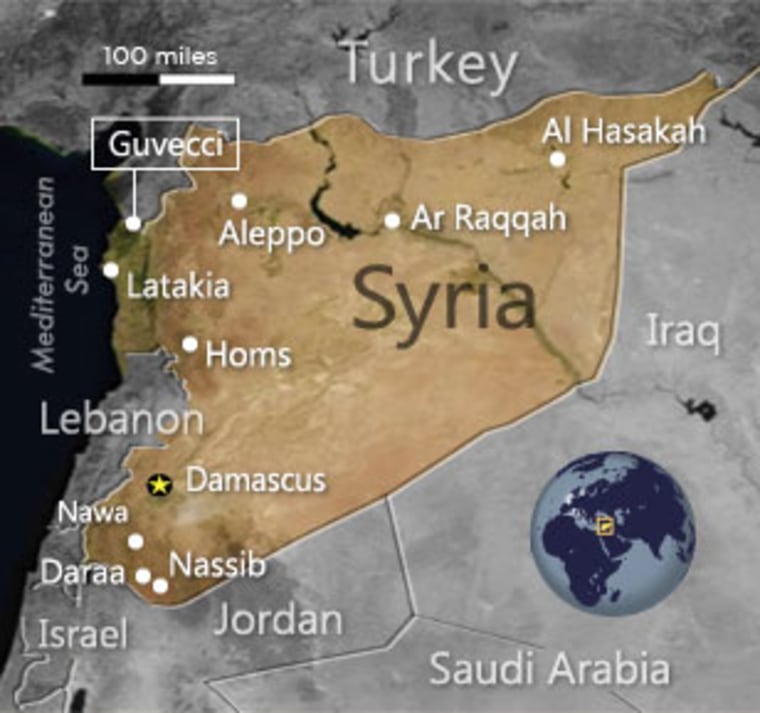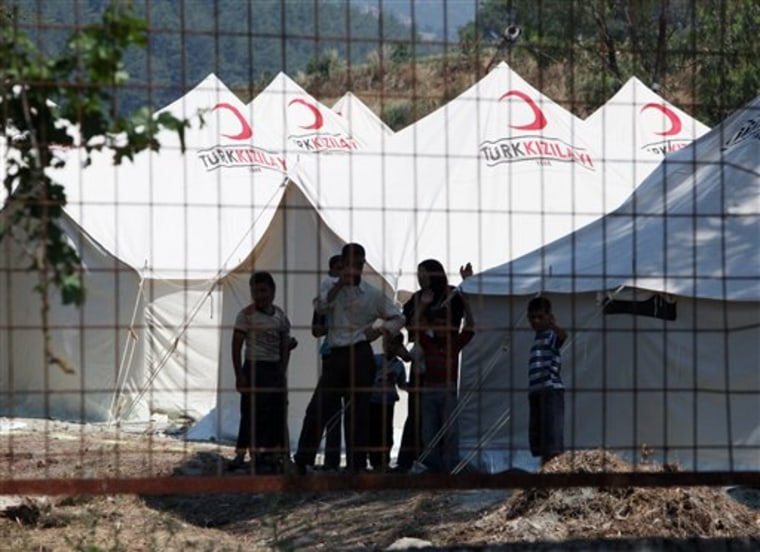Syrian policemen turned their guns on each other, soldiers shed their uniforms rather than obey orders to fire on protesters, and three young men who tried to escape were beheaded by forces loyal to President Bashar Assad.
As more than 2,400 Syrians streamed across the open Turkish borders on Thursday ahead of tanks and troops who surrounded their hometown, they brought with them the first accounts of a week of revolt, mutiny and mayhem in Jisr al-Shughour. The streets were deserted, leaving no resistance against a regime equipped for all-out battle.
Even safe in Turkish camps 12 miles (20 kilometers) away, the Syrians said they feared the authoritarian government's reach and refused to allow their full names to be used.
A young man who identified himself as Rami said the Syrian reinforcements were mobilized in response to a mutiny among police and soldiers, sharply divided over how to disperse the protesters.
"It all started with the killing of two protesters a week ago, then policemen who refused orders from the Alawite police chief to fire on civilians clashed at the Emin Asqari police station," Rami said through an interpreter. Other Syrians nodded or interrupted with more details. Syria's ruling elite, including the Assads, belong to the minority Alawite sect.
"Then, some soldiers deserted also after refusing to fire on the protesters, some took off their uniforms, left their weapons and ran away with their families," added Rami, a skinny 22-year-old who was studying at a university in Jisr al-Shughour to become a math teacher. "Two helicopters also fired randomly on civilians as well as houses that triggered the exodus."
Rami said he can't reach many of his friends.
"I fear for their lives," said Rami. "Assad's forces beheaded three young men from Latakia when they said they were going to Turkey. We buried them yesterday in a village across the border."
The struggle over Jisr al-Shughour and the surrounding Idlib province is a critical test for the 40-year Assad regime, which has said "armed groups" killed 120 security forces in the area this week.
Crackdown toll mounts
Syrian activists say more than 1,300 people have died in the crackdown on the 11-week uprising, most of them unarmed civilians; a government spokeswoman countered that 500 security forces had died in the uprising, including 120 who died in the Jisr al-Shughour area this week.
"The only instance where security forces have fired is when they have been fired at," Reem Haddad told Britain's Sky News. "How have these people been killed for goodness sake if no one is firing at them?"

Jisr al-Shughour emptied as its residents crossed olive groves and traveled gravel roads, trying to get away from the tanks and elite forces believed to be led by Assad's younger brother, Maher, residents and an activist said. Turkey's foreign minister said 2,400 Syrians had crossed the border.
"It is virtually a ghost town now," said Rami. "Almost everyone fled mostly toward nearby villages, but many more are prepared to cross into Turkey if Assad's forces start hunting them."
A man who stayed behind in Jisr al-Shughour confirmed that the town was all but empty, and people in a nearby village warned that hundreds of soldiers were massing, along with 27 tanks and 50 armored personnel carriers.
As more Syrians took up temporary residence in tents and with Turkish relatives, the uprising against the Assad regime drew increasing scrutiny abroad.
At a gathering of diplomats in Abu Dhabi, U.S. Secretary of State Hillary Rodham Clinton said Syria was a main topic of discussion. And four European nations on Wednesday presented a revised resolution to the United Nations condemning Syria for the crackdown.
"President Assad may try to delay the changes under way in Syria but he cannot reverse them," Clinton said.
In Geneva, Navi Pillay, the U.N.'s High Commissioner for Human Rights, accused Syria of trying to "bludgeon its population into submission" by attacking anti-government protesters with snipers, tanks and artillery.
But Haddad, the government spokeswoman, said residents had asked troops to come and restore order.
Residents welcome soldiers
In a village about 6 miles (10 kilometers) from Jisr al-Shughour, residents came out to the streets to welcome Syrian soldiers heading toward the northwestern town. Some threw roses while others offered them cheese, yogurt and other food, according to a Syrian reporter accompanying the troops.
Ahmed Ali, 47, told the reporter, "we are very pleased to see the army who came to rescue us from those criminals."
The Syrian government, which sharply restricts local media and expelled foreign journalists from Syria, has blamed recent violence on gunmen and religious militants.
Ahead of the incoming forces, groups of Syrians were crossing into Turkey by the hour, on motorbikes, pickup trucks and on foot.
"I don't want to die. I want Bashar Assad to go," said one Syrian teenager, who identified himself as Ahmad. Activists say more than 10,000 people have been detained since the uprising began in mid-March.
Turkey and Syria once nearly went to war, but the two countries have cultivated warm relations in recent years, lifting travel visa requirements for their citizens and promoting business ties. By allowing Syrian refugees, the Turkish government is playing the role of a humanitarian provider even as it urges the Assad regime to stop its crackdown and implement democratic reforms.
Turkey and Syria share a 520-mile (850 kilometer) border, which includes several Syrian provinces. Refugees appeared to be crossing unimpeded on Thursday around Guvecci. Turkish guards set up a table on one road to record names, but there was no sign of Syrian guards on the other side.
The Turkish province of Hatay has a sizable Arabic-speaking population. It gained independence from Syria in 1938 and joined Turkey in a plebiscite a year later. Families in some villages were split when the borders were finalized in 1948.
"We will keep our doors open to all Syrians seeking refuge in our country. It would be out of the question for us to close our doors at a time when deaths have intensified and our brothers are seeking the possibility of refuge," Turkish Prime Minister Recep Tayyip Erdogan said Thursday.
Syrian tanks were also deployed in Aleppo, the border province that is home to Syria's second-largest city of the same name, Erdogan told CNN-Turk television late Wednesday.
"There are tanks in the streets," Erdogan said. "They seem to have lost control there."
Mustafa Osso, an activist in Syria, and a resident of the city of Aleppo, who spoke on condition of anonymity for fear of government reprisals, said tanks were in at least two towns in the province.
